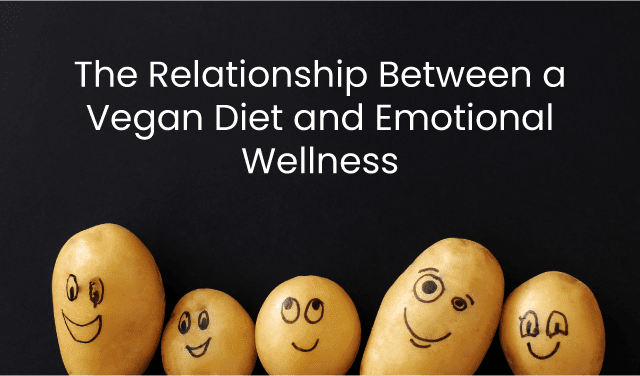Introduction
Different diets are followed worldwide, and every diet has its unique benefits. So why go on a vegan diet? Are there any special benefits to this diet?
What is a vegan diet?
A vegan diet contains plant-based foods such as fruits, vegetables, nuts, grains, seeds, and legumes while excluding all items produced by animals. Eggs, meat, milk, and meals derived from milk are avoided. Many plant-based diets meet the need for necessary nutrients entirely. A vegan diet is gaining popularity nowadays.
However, you may wonder if such a sudden change in diet will affect your mental health. It’s pretty practical to think that way as you may have to give up your favourite foods such as fish fingers or lattes. Changes in your diet affect your health as well as your emotions.
Let’s look at the connection between a vegan diet and emotional wellness.
The relationship between diet and emotional wellness
Food affects our mood. Researchers have studied the connection between diet and emotional wellness for a long time. We often experience a change in our appetite when we are stressed, and we eat fried foods or sweets. Similarly, certain comfort foods sometimes help in relieving our stress. Some instances of how our diet [1]affects our physical and emotional wellness are as follows[2]:
-
Research suggests refined carbohydrate consumption is associated with an increase in depression in addition to increased weight gain.
-
According to some studies, foods that reduce inflammation also reduce the risks of depression.
-
Food changes our gut microbiome. There is a strong connection between the composition of our gut microbiome and our mood via the gut-brain axis.
-
Green leafy vegetables contain magnesium, which helps relieve anxiety. Therefore, a vegan diet rich in vegetables will positively affect your mood.
Benefits of a vegan diet
Many people have chosen a vegan diet in search of better health. They remove animal exploitation from their lifestyle and do not eat animal-based products nor use animal-derived items like leather bags. Concerning health, there are some physical benefits of a vegan diet:
-
Weight loss: A vegan diet is plant-based and rich in fibre, water, and complex carbohydrates. It makes it a perfect diet for weight loss. We can overcome obesity by adhering to this diet. Avoiding processed foods also helps to maintain weight in a healthy range.
-
Diabetes: Choosing vegan food options low in sugar can help treat insulin resistance and control blood glucose.
-
Heart disease: A vegan diet is low in fat content. Therefore, it is especially suitable for people having heart disease.
-
High blood pressure: Some studies have shown that a vegan diet is associated with lower systolic and diastolic blood pressure.
-
Mortality: A vegan diet is associated with lowered mortality due to the non-consumption of meat.
-
Emotional health: One scientific study[3] has shown that people who consume a plant-based diet have lower anxiety and low stress.
-
Cognitive health: A vegan diet may help prevent or delay adult cognitive decline. Research proves that several fruits like berries, grapes, and nuts help improve cognitive functions.
Challenges of a vegan diet
Every diet comes with its challenges. Vegans choose a completely non-animal, plant-based diet, and they go off dairy and also stop using items made from animals. Here are the challenges [4] of a vegan diet:
-
Inadequate nutrition: Many nutritionists regard a vegan diet as insufficient. According to them, a person on a vegan diet may suffer from deficiencies in essential micronutrients like Zinc, calcium, and vitamin D.
-
Low energy: A vegan diet is a low-energy diet. Since there is no consumption of dairy products, the overall intake of calories may become less, and it may cause weakness.
-
Trouble while grocery shopping: Some vegan items may be expensive and difficult to find in convenience stores.
-
Environment impact[5]:
-
Some vegan products, such as those obtained from fermenting fungi (mycoprotein), impact global warming more than meat items do.
-
Milk alternatives such as almond milk may have an agricultural impact. Additionally, there are concerns about the preservation and the use of artificial flavours and sweeteners.
-
Cheese alternatives like soy and palm oil are non-sustainable and lack nutrition.
-
Microalgae are aquatic plants in the vegan diet as a rich omega and fatty acids source. However, microalgae are also food for marine animals like fish. Therefore, increased use of microalgae may have ecological and environmental risks.
-
Top tips for emotional wellness
Although some research has studied the benefits of a vegan diet for treating depression and anxiety, several papers report otherwise. Our emotional health is equally important as our physical health. Emotional wellness does not mean the person never has negative feelings, and emotional wellness has enough mental strength to cope with life’s uncertainties without losing emotional balance.
Here are a few tips[6] for emotional wellness:
-
Making appropriate food choices in vegan items:
-
Vegetables rich in polyphenols, fibres, and probiotics cure depression.
-
Colourful and fresh fruits elevate your mood.
-
Grains, beans, fruits, and vegetables reduce inflammation and inhibit enzymes that metabolize feel-good neurotransmitters, increasing their concentration.
-
-
Stay physically active. Work out regularly. Exercise is considered a natural way to overcome depression.
-
Get a good night’s sleep. Research tends to link a lack of sleep to depression.
-
Think of helpful thoughts. Positive thinking, confidence, and hope can help reduce anxiety.
-
Meditate and perform yoga regularly. Mindfulness and meditation help reduce stress and anxiety and also calm down thoughts in your mind.
-
Concentrate on breathing exercises.
-
Connect with others. Socialize.
-
Have a hobby and pursue it. Engaging in hobbies has been shown to reduce stress, improve emotional well-being, and reduce depression.
Conclusion
Diet plays a vital role in physical and mental, and cognitive health. People change their diet plans primarily for health benefits, and the same applies to following the vegan diet and avoiding consuming and using animal-based products.
Little clinical evidence shows how a vegan diet boosts mood and emotional wellness. Choose food items that will benefit your emotional health. Your emotional wellness is in your hands; stay mentally and physically fit. Please choose what you eat wisely, as it will affect your emotional wellness.
[1] M. F. Lee, R. Eather, and T. Best, “Plant-based dietary quality and depressive symptoms in Australian vegans and vegetarians: a cross-sectional study,” BMJ Nutr. Prev. Health, vol. 4, no. 2, pp. 479–486, 2021.





